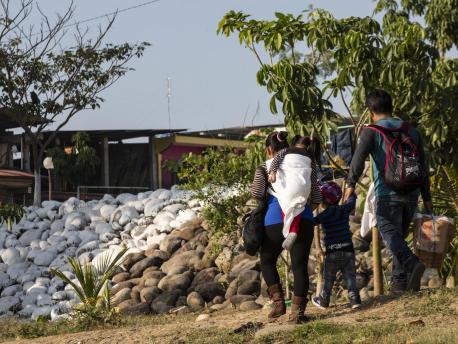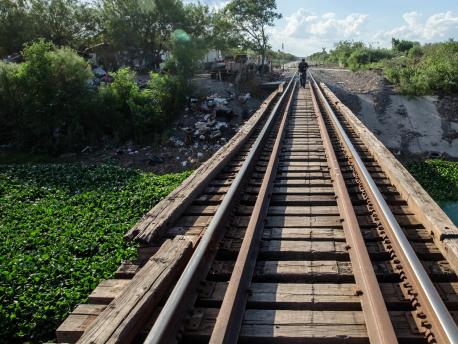
How UNICEF Helps Young Migrants in Central America, Mexico & the U.S.
FAQs: Here's how UNICEF and UNICEF USA are working with partners to support and protect migrating children every step of the way.
UNICEF and partners are working tirelessly all over the world to save and protect children.
Why are people migrating to Mexico and the U.S.? Where are they from?
Gang-related violence, extortion and forced recruitment are a daily reality in northern Central America, affecting children's lives in their schools, their homes and their communities. This pervasive violence is compounded by extreme poverty and limited access to quality education, social services and livelihood opportunities, pushing families away from their homes and onto dangerous irregular migration routes. Many children are driven to head north to reunite with parents already working in the U.S.
They leave home because they feel they have no choice.
Official data shows that the overwhelming majority of migrants arriving in Mexico are from the countries of northern Central America: Honduras, Guatemala and El Salvador.
Are they refugees or migrants?
According to international law, uprooted children and their families are considered migrants until the point at which they request asylum and become asylum seekers. They would be considered refugees once asylum has been granted.
All people have the right to request asylum without being criminalized, turned away or separated from their children.
A child is a child first and foremost and has the right to protection and essential services regardless of immigration status.
What are the dangers facing children?
Families fleeing to Mexico and the U.S. must navigate a long, uncertain journey during which they are at risk from exploitation, violence, abuse and financial extortion at the hands of human smugglers and traffickers, as well as prolonged exposure to the elements, hunger, thirst and physical injury.
They may be apprehended in transit or upon reaching their destinations, only to be detained and then returned to their countries of origin. Children who are separated from their families experience trauma that causes lasting damage to their mental, emotional and physical health.
What is UNICEF doing to help migrant children in Mexico?
UNICEF has a strong presence in Ciudad Hidalgo, Tijuana and Tapachula, working with the Mexican Government and partners to monitor the treatment of refugee and migrant children and ensure that they receive the support and services they need and that their rights are upheld.
UNICEF prepares and distributes information for migrant children and families about their options and advocates that all unaccompanied children receive a humanitarian visitor's card, which provides access to family- and community-based alternative care and social services. UNICEF also operates activity centers where children can go daily to play, relax and receive counseling and provides temporary water, sanitation and hygiene facilities for families at some transit points. UNICEF coordinates with shelters and supports the management of individual cases to ensure that migrant children are placed in appropriate alternative care settings.
UNICEF Mexico has invested in piloting alternatives to detention, namely one in Tabasco known as an "open-door shelter." In practice, open-door shelters are community-based residential care facilities at which children receive psychosocial support, have access to education and health services, and get legal information and assistance — these shelters serve as one alternative to detention.
As a result of the open-door shelter's success, the Mexican government has committed to working in partnership with UNICEF to bring this model to scale on a national level so that no children are detained for migration purposes.
What assistance does UNICEF provide to refugees and migrants inside the U.S.?
For many years, UNICEF offices in Central America have been working to strengthen national protection systems and address the root causes of migration (see below for more details). Yet children continue to arrive in the U.S., and so UNICEF's vital programs are moving with them.
UNICEF and UNICEF USA work with regional and U.S.-based NGOs to enhance cross-border information sharing, case management and referrals and offer technical assistance on child-sensitive returns and reintegration.
To replace detention facilities, UNICEF is working to build support for and awareness of safe, cost-effective alternatives to detention and hopes to scale up programs that work. UNICEF is also supporting the mental health and psychosocial service response for children and families in the Rio Grande Valley. UNICEF also advocates for the equal treatment of children and briefs congressional members on the situation in the region.
What is UNICEF USA doing about detention/separation?
UNICEF USA, alongside partners such as the American Academy of Pediatrics (AAP), has communicated directly to U.S. Government officials and Members of Congress concerns regarding the detention of children (with or without families) and family separations, noting that these practices have traumatic effects on children that can cause lasting damage to their mental, emotional and physical wellbeing.
What are the recommended alternatives to detention?
Alternatives to detention include placing children in a foster-care setting, group home or open-door shelter, such as the ones UNICEF has worked to pilot in Mexico.
How is money raised around this issue being spent?
In the U.S., UNICEF USA is working with trusted partners such as the U.S. Conference of Catholic Bishops (USCCB) and the San Diego Rapid Response Network (SDRRN) to support respite centers for migrant children and families. Respite centers provide meals, basic first aid or medical treatment, fresh clothing, showers, temporary shelter and general guidance.
Built out by Jewish Family Service San Diego (JFS) and the ACLU San Diego in 2017, the SDRRN includes eight core partners, including human rights and service organizations, and operates the largest respite center for asylum-seeking families in the San Diego border region. To date, the SDRRN has served more than 7,500 individuals, with an average of 60 new asylum seekers each day (though lately the numbers have been as high as 100 per day).
The USCCB provides national coordination and per capita funding to multi-service organizations for asylum-seeking families and unaccompanied children. UNICEF is supporting selected agencies in the USCCB network, based on their recommendation of needs, including Catholic Charities of the Rio Grande Valley in McAllen, TX, which operates an emergency respite center in the sector with the largest number of families and unaccompanied children on the southwest border.
How is UNICEF helping address the root causes of migration in countries of origin?
UNICEF offices in Honduras, Guatemala and El Salvador have expanded their efforts to break the cycle of violence and poverty that drives so many desperate families to leave home. UNICEF works to reduce violence through the creation of safe spaces, alternative education programs and vocational opportunities.
To build more peaceful communities, UNICEF supports the teaching of nonviolent discipline methods to parents and teachers, and helps former gang members reintegrate into society with programs including job skills training, drug and alcohol treatment and gang tattoo removal.
UNICEF programs provide targeted support to strengthen national and local child protection systems that detect and protect children affected by violence. This includes providing counseling and raising awareness around the risks of irregular migration and its impact on families, communities and children.
UNICEF provides returned migrant children with specialized psychological support to address trauma and stigma and supports their social reintegration. UNICEF also advocates for further investment in national child protection systems to reduce exploitation and violence and supports government efforts to strengthen cash assistance programs to help families in need.
What is UNICEF asking all governments to do?
Uprooted children, especially those traveling alone, need to be protected and treated with dignity. UNICEF urges all governments everywhere to keep the best interests of children above all considerations in the application of immigration laws and policies by letting families stay together, keeping children out of detention and ensuring that children can continue their educations.
Top photo: A family crosses the Suchiate River at the Mexico-Guatemala border near Ciudad Hildalgo, Mexico on January 31, 2019. © UNICEF/UN0278763/Bindra
HOW TO HELP
There are many ways to make a difference
War, famine, poverty, natural disasters — threats to the world's children keep coming. But UNICEF won't stop working to keep children healthy and safe.
UNICEF works in over 190 countries and territories — more places than any other children's organization. UNICEF has the world's largest humanitarian warehouse and, when disaster strikes, can get supplies almost anywhere within 72 hours. Constantly innovating, always advocating for a better world for children, UNICEF works to ensure that every child can grow up healthy, educated, protected and respected.
Would you like to help give all children the opportunity to reach their full potential? There are many ways to get involved.





